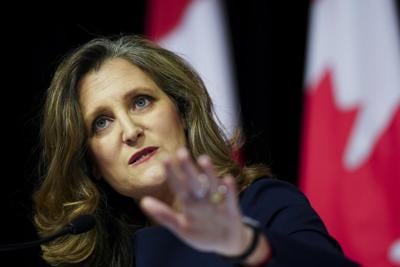OTTAWA ÔÇö Some major business lobby groups are banding together to denounce the federal government’s proposed increase to capital gains taxes, calling it a “short-sighted” and divisive move that will hamper economic growth.┬á
In a joint letter slated to be sent Thursday morning, the groups called on Finance Minister and Deputy Prime Minister Chrystia Freeland to scrap the pledge, revealed in last month’s federal budget, to hike taxes on capital gains after June 25.┬á
The government insists the increase will only impact the wealthiest Canadians and a minority of businesses, while reaping more than $19 billion for federal coffers ÔÇö and billions more for provincial governments ÔÇö over the next five years to help pay for programs like public medical coverage and housing supports.┬á
But the business groups who sent Thursday’s letter ÔÇö the Canadian Chamber of Commerce, the Canadian Federation for Independent Business, the Canadian Manufacturers and Exporters, the Canadian Venture Capital and Private Equity Association, the Canadian Franchise Association and the Canadian Canola Growers Association ÔÇö argue those revenues will come at the expense of economic growth driven by private enterprise.┬á
“While this proposed measure attempts to provide a solution to Canada’s deficit, it is short-sighted and complex, and it sows division at a time when we need a Team Canada approach to economic growth,” the letter says.┬á
“Increasing taxes on productive investments and throttling Canadian potential will have profound, long-lasting and potentially irreversible repercussions.”┬á
The Liberal government has said it will expand the ”capital gains inclusion rate,” which is the proportion of profits from an investment ÔÇö like stocks, real estate, or the sale of a business ÔÇö that is subject to income tax.
For individuals, the government says it will increase the inclusion rate from 50 per cent to 66.7 per cent, but only for profits beyond $250,000. Freeland’s office has stressed that capital gains taxes don’t apply to the sale of someone’s principal residence, so the higher taxes would only impact the sale of a second property, like a family cabin or a real estate investment. The government estimates that only about 40,000 people earn more than a quarter-million dollars in capital gains in a given year.┬á
The higher inclusion rate of 66.7 per cent would also apply to all businesses, but the government says only a “small minority” of them post capital gains profits. The April budget said 12.6 per cent of Canada’s 2.4 million corporations posted capital gains profits in 2022.┬á
To soften the impact on businesses, the government said it will increase the lifetime exemption for the sale of a business, so that the first $1.25 million in profit is exempt from the capital gains tax. ItÔÇÖs also introducing a new ÔÇťentrepreneursÔÇÖ incentiveÔÇŁ so that next $2 million in profits ÔÇö┬ápossibly on top of the tax-free $1.25 million ÔÇö┬áfrom the sale of eligible businesses would get a lower capital gains inclusion rate of 33.3 per cent.┬á
Taken together, the changes mean that someone selling a business might not see the increased capital gains tax until their profits exceed $3.5 million.
And since the increased exemption and lower rate for entrepreneurs actually decreases the amount of capital gains tax for some profits, someone booking earnings for the sale of a business of up to $6.25 million might actually be better off once the governmentÔÇÖs changes are implemented, FreelandÔÇÖs office says.
Thursday’s letter from the business groups argued these changes will impact far more Canadians than the government claims, including through what they predict will be fewer new companies and jobs created as investors put their money elsewhere to avoid the higher tax. The groups also echoed alarm bells from doctors’ groups like the , which warned it could be harder to recruit physicians who would have to pay higher taxes on investments they make to save for retirement and parental leave within their incorporated practices.┬á
Asked about the changes last week, Freeland defended the proposal in the face of such criticism, stating that “it is fair to ask those in our country who are at the very top to contribute a bit more” to help pay for programs the government says are needed.┬á
She said the government is still committed to the move, which will come in legislation that hasn’t yet been tabled in Parliament.┬á
Error! Sorry, there was an error processing your request.
There was a problem with the recaptcha. Please try again.
You may unsubscribe at any time. By signing up, you agree to our and . This site is protected by reCAPTCHA and the Google and apply.
Want more of the latest from us? Sign up for more at our newsletter page.


























To join the conversation set a first and last name in your user profile.
Sign in or register for free to join the Conversation